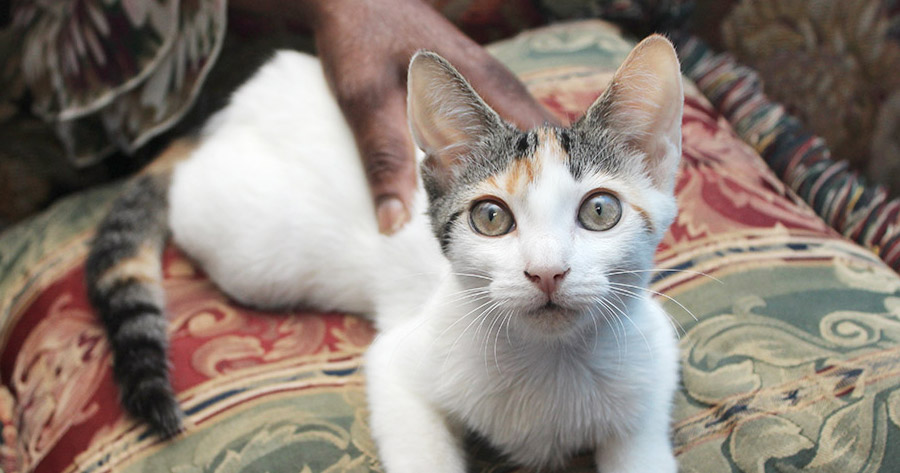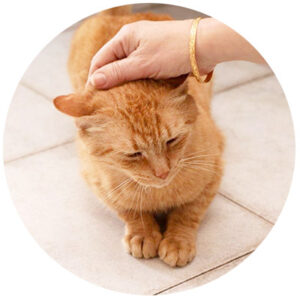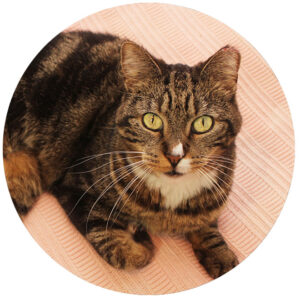Dealing with Cat Allergies

But a cat allergy doesn’t necessarily mean you can’t live with a kitty or two. In many cases, even people with cat allergies become accustomed to the cats they have. While they may still be allergic to other cats, they won’t be allergic to their own. Otherwise, in dealing with a cat allergy, a lot depends on how bad the allergy is and what kind of cats you have. But there are also steps you can take to minimize the problem.
The “Hypoallergenic Cat” Myth or Fact?
According to the Asthma and Allergy Foundation of America, a truly hypoallergenic cat does not exist. If you have a cat allergy, your body’s immune system reacts to proteins in the pet’s urine, saliva or dander. Pet hair is not the actual allergen, though it can collect dander, urine and saliva. Very long or thick cat hair may hold more dander, which is where the misconception that the “hair” allergen arises. The good news is that in many cases, allergies to cat dander can be controlled!
The following are some recommendations for allergy sufferers.
Your Home
- Get a good vacuum with a HEPA filter and vacuum floors and upholstery frequently. Wet swiff or mop floors weekly. Declutter your home, so dust and cat hair don’t accumulate.
- Throw a sheet or cover over couches, beds and upholstered furniture; it can be washed frequently and removed for guests.
- Clean air conditioner filters weekly.
- Carpets are not great for allergy sufferers, because they hold all sorts of particles. This is also true for fabric window treatments and curtains.
- Blinds also hold particles, so take them down and rinse them off on occasion.
- Make sure to vacuum out radiators before heat comes on in winter.
- Get a simple cold-water humidifier for the winter months. Dry winter air in apartments dries out the nasal passages and causes inflammation.
- Do not use Febreze’s allergen reducer – unfortunately, it seems to cause cats to pee!
- Get a good air purifier or two – one that specifically says it works on animal dander. Air purifiers can make a huge difference to allergy sufferers, and not just for cat allergies!
For high-quality products for allergy sufferers, check out AllergyBuyersClub.com.
Your Cats
- Bathe them regularly if you can – despite the stereotype, many cats are fine with water, or can learn to accept it. If you can not bathe regularly, you can use hypo-allergenic pet wipes. These wipes help remove the allergen contained in dander.
- Use ALLERPET for cats on their coats once a week – put it on and brush it off. Most pet stores carry it, and it can be purchased online as well. There are also a number of other anti-allergy products available in pet stores.
- Brush your cat regularly using a deShedding brush. This will reduce shedding significantly.
- Give your cats a teaspoon of flaxseed oil in their wet food once a day. It’ll reduce skin dryness, which cuts down the dander.
- Feed your cat high quality and nutritionally balanced wet food. This will keep your cats coat healthy and insure that the skin stays well hydrated, thereby reducing dander production and distribution.
You (tips from one of our rescuers who suffers from allergies herself!)
Take allergy pills like Benedryl at night – they’ll knock you out and reduce histamines the next day.
- For sneezing, runny nose and itchy eyes, allergy eye drops really work. They will sting at first, but won’t make you drowsy.
- A beer will sometimes stop a runny nose—which can calm other allergy symptoms as well.
- Advil is helpful, since it’s an anti-inflammatory. Ginger and garlic are also natural anti-inflammatories.
- Try flaxseed oil in your food (salad dressing, soup, etc.).
- Cut down on sugar, which triggers inflammation. There are many alternatives!
- Visit an allergist and see if they can give you injections.
- Stay hydrated, especially in winter.
- Please note that sometimes cat allergies can be more pronounced when first living with a cat, or if it has been a long time, and they can subside within a few months.
Additional Resources
Here are a few sites with more info on allergies and how to deal with them:


 Take allergy pills like Benedryl at night – they’ll knock you out and reduce histamines the next day.
Take allergy pills like Benedryl at night – they’ll knock you out and reduce histamines the next day.